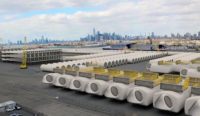These risks including mixing the waters of the Red Sea and Dead Sea "unless adequately studied"; a seismic event or "intentional damage" to infrastructure; high energy costs; some needed "involuntary resettlement"; impact of desalination brine on the Dead Sea and aquifers; and the impact on Israeli potash and chemical production of red algae and gypsum formations.
But says McPhail, “The most adverse effects could be substantially mitigated by readily available and proven methods and technologies.”
According to a report last month in The Jerusalem Post, Israel's Ministry of Environmental Protection generally supports the project but first wants a pilot-scale version built to test the water-transfer processes and their potential impacts on the water quality and ecology of the Dead Sea. The study models outline the water-transfer processes.
Minister Gilad Erdan says his concern is based on a preliminary study by the ministry that found that replenishing the Dead Sea using water from the Red Sea could cause algae and bacterial blooms, fill the sea with calcium sulfate and cause a stench from sulfur hydroxide emissions.
Experts at Friends of the Earth and the Israel Union for Environmental Defense have been sharply critical of the World Bank proposals.
The studies are "ridden with uncertainties regarding quite disastrous effects this project may have on the Dead Sea, the Red Sea and the Arava Valley aquifer,” says Sarit Caspi, a water expert at the union. She claims one outcome of the project is “that it will destroy the Dead Sea as we know it.”
Gideon Bromberg, Friends of the Earth executive director in Tel Aviv, says the group recommends a combination of desalination and proposed water imports from Turkey or other nearby countries, says The Jerusalem Post.
McPhail acknowledges concerns over the impact of adding more than 400 million cu m of water per year to the Dead Sea as well as funding uncertainties to complete the project in the proposed six years.
The main supporter of the project continues to be Jordan, which is facing a huge water shortage. “Moving ahead with the project in some way is vital to Jordan’s future,” says Saad Abu Hammour, secretary general of the Jordan Valley Authority and chairman of Jordan’s Red-Dead Sea steering committee.
Engineering firms that contributed to the Red Sea-Dead Sea water-project studies include French firms Coyne & Bellier, Tractebel and BRL Ingenierie; Holland-based Kema; U.K.-based ERM, Germany's EcoConsult, Venice-based Thetis and Israel's Tahal.





Post a comment to this article
Report Abusive Comment